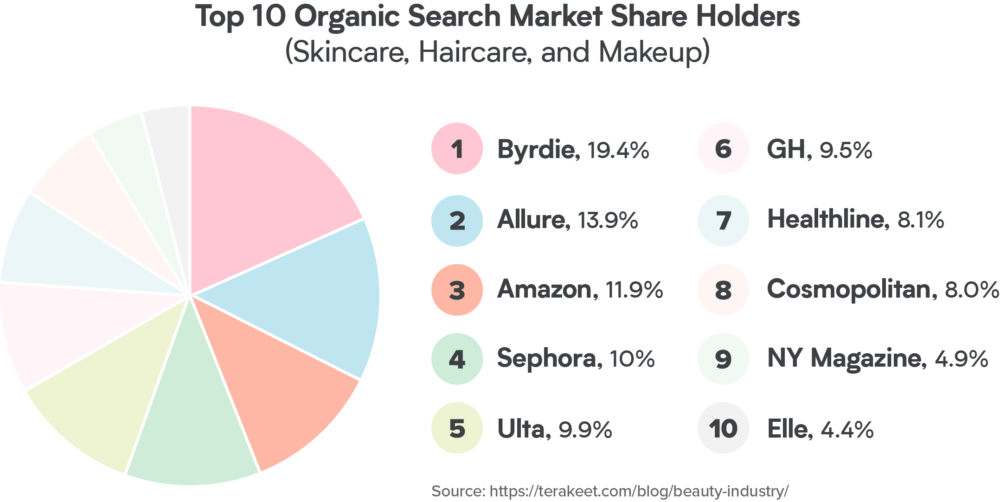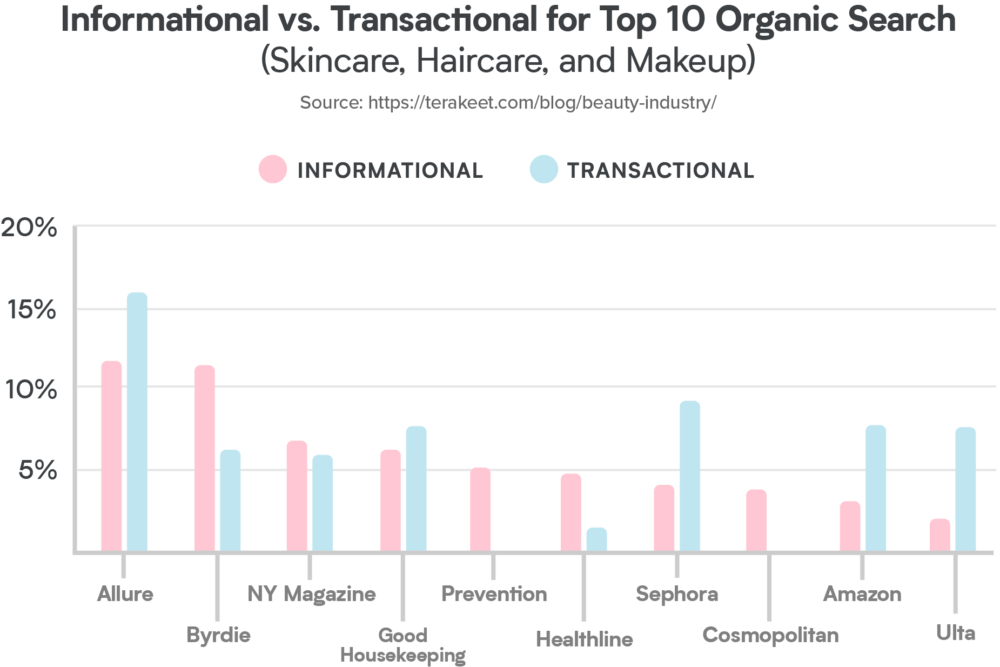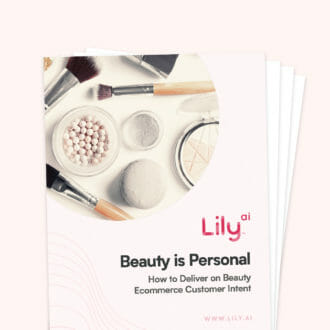Giving Beauty a Boost: Part 1
Although today’s consumer is knowledgeable, sophisticated, and generally knows exactly what they want or need in a beauty product, giving your beauty brand a boost to meet the needs of that informed consumer doesn’t need to be complex.
Lily AI knows that small details drive beautiful results and helps to supercharge the entire e-commerce stack with customer intent in an entirely new and revolutionary way. In part one of this two part blog series, we’re going to focus on the key areas of site search, personalization and SEO/SEM, and how Lily can boost the consumer experience and revenues for brands currently focused on digital transformation in the beauty industry.
Boost Your Site Search
Consumers have many choices in front of them, so it’s no surprise that they’re quick to abandon an e-commerce site that doesn’t present them with what they want at the exact moment they want it.
According to research conducted by The Harris Poll:
- 94% of U.S. consumers say they have received irrelevant results when searching on retail websites.
- 76% of consumers report that an unsuccessful search has resulted in them abandoning the retailer altogether (i.e., a lost sale).
- 52% of consumers say they typically abandon their entire cart and go elsewhere if there’s at least one item they’re unable to find.
- 69% of consumers say that after a successful search experience, they’re more willing to purchase additional items.
- 99% of consumers agree they’re at least somewhat likely to return to a retailer’s website if it has good search functionality.
A bad search experience can truly be costly, while a good search experience often results in higher conversion rates, larger order sizes, and ongoing brand loyalty.
This is why boosting your site search is so important. Retailers who make it easy for customers to find what they’re looking for are the retailers who see results. To avoid becoming just another cart abandonment statistic, once a customer has arrived, you need to be able to match customers with the products they’re actually looking for in their site search.
One of the biggest challenges we see for on-site search is a lack of product data: the lack of descriptors of attributes about the product, and the inability to be able to drive dynamic or interesting copy based on product attribution. When the Lily AI customer intent platform takes customers’ data in and runs it through our machine learning and AI pipelines, we can then give back super rich, super deep, and super consistent beauty product attribution data about each item.
By matching deep tagging of products (with 15,000+ attributes) with deep profiling of consumer motivations, Lily AI can help present every unique consumer with exactly what they’re looking for in real time. On-site searches now show customers the results they’re truly expecting, along with targeted recommendations to help boost order sizes.
This can be done with useful facets and filters, object detection, similar item generation, and more. Retailers can also guide users directly to the items they really want through the use of granular product data and enabling long-tail semantic searches and predictive autocomplete.
With Lily AI, beauty retailers that support semantic searches can reduce cart abandonment to as low as 2% by matching shoppers to the exact products they’re searching for on a site.
Boost Your Personalization Potential
Personalization in beauty is powerful. According to Epsilon Research, 80% of consumers are more likely to make a purchase when brands offer personalized experiences. However, without understanding the relationship between attributes, beauty brands are going to struggle with personalization and are likely to find themselves unable to personalize and provide the right recommendations that convert.
Lily AI can deliver personalized, relevant shopping experiences in less than five clicks as we match granular product details with customer preferences. By pairing image recognition to extensive product attributes (product intelligence) with machine learning, we can help brands to build an unprecedented personalized shopping experience and deliver the product recommendations that actually convert.
Lily AI uses its extensive product data to train its AI models, which means we know more about what shoppers are actually browsing and buying – and why. Lily AI’s product attributes platform genuinely gives brands the ability to address “a segment of one,” or “the shopper in the moment,” based on their unique style, preferences, or occasion. This truly personalized experience is key when it comes to boosting performance.
Boost Your SEO/SEM
Great Search Engine Optimization (SEO) and Search Engine Marketing (SEM) starts with having great product data, which is a key challenge for many retailers currently.
Historically, the bulk of beauty products have been purchased in brick-and-mortar stores, but that’s changing rapidly, with online sales projected to make up 48% of the total of purchases by 2023, according to Common Thread Co. Although this growth in online purchasing was already occurring prior to 2020, the COVID-19 global pandemic greatly accelerated it. Looking at the overall picture, the online channel for beauty in the U.S. grew by 5.6% in 2020, whereas the offline channel contracted by 1.2%, according to Statista.
There’s no doubt about it that consumer behavior has shifted. As more people research and purchase beauty products online, it’s critically important for brands in the cosmetics industry to seize the growing opportunity of organic search.
However, an analysis of Google organic search market share in the beauty industry revealed a surprising reality when Terakeet analyzed 3,168 high-value, non-branded beauty industry search queries. This accounts for 112.7 million annual Google searches in the U.S and the keywords span three vital markets, including skincare, makeup, and haircare. The surprising reality is that publishers and informational sites both significantly outperform beauty brands and retailers when it comes to Google organic search.

When Terakeet compared informational vs. transactional searches, online publishers significantly pulled ahead by taking their place as the top six market shareholders for informational searches. Only three of the top ten were beauty retailers. Even among more product focused searches, informational websites like Allure, Good Housekeeping, and Byrdie all held their own and performed well.
In comparison, brands like Sephora and Ulta tend to perform better than the traditional beauty brands in organic search. However, they still lag behind many publishers, blogs, and even health-related websites, depending on the type of keyword.

Highlight: E-Commerce Customer Intent
Customers signal their intent by searching for what matters most to them. It’s key for retailers to distribute products that are instantly shoppable by harnessing the power of beauty product attribution data that converts.
Consider this: a consumer may not be able to find a beauty brand’s products on Google because they’re not searching for generic, legacy attributes. They’re looking for consumer-driven attributes in the language that they personally use to describe products, so they’re often not even arriving on the right beauty retailer’s site to begin with.
The primary way Lily understands customers is through a detailed stylistic analysis of the products they are looking at. Lily AI has built a platform of image and text classification models that can identify hundreds of detailed style attributes in product images and descriptions: formulation, functionality, a product’s benefit, etc. These models allow us to understand a retailer’s catalog in fine detail.
Once we understand the stylistic details of a retailer’s products, it becomes easier to understand customer intent. By looking at the style attributes of the products a customer has viewed in the current session, we can recommend products that are tailored to their intent. This generates rich, deep, and consistent attribution about every product and drives dramatic increases in relevance and conversion for on-site search.
With Lily, retailers in beauty can move these same results “up the funnel” to search providers like Google and Bing, and ensure that more high-purchase-intent customers land on your site, and not someone else’s.
Lily AI can work for beauty brands to boost SEO and SEM with relevant product data that powers relevant search results. Search engines and product listing ads are looking for content on your site that is static and relevant, and they’ll reward you for getting it right. It’s simple: the better product data a brand can proactively provide to a search engine for their SEO marketing and paid e-commerce listings, the more consumers will find that data in their searches – then buy up what is being sold.
Thrive in Today’s Beauty Industry with Lily AI

